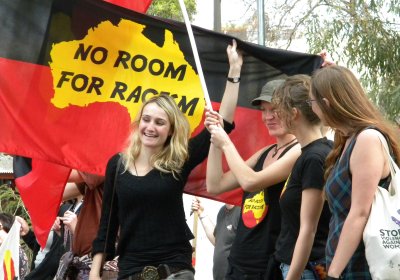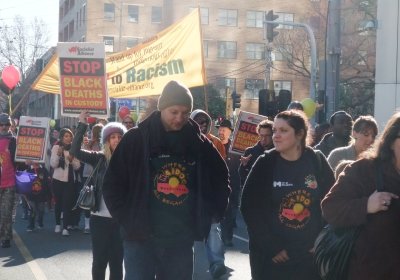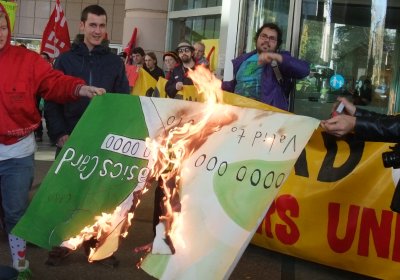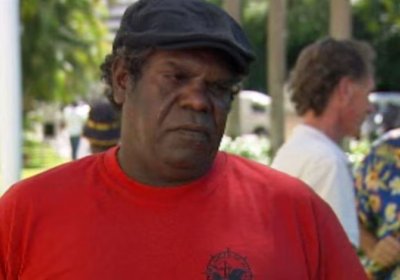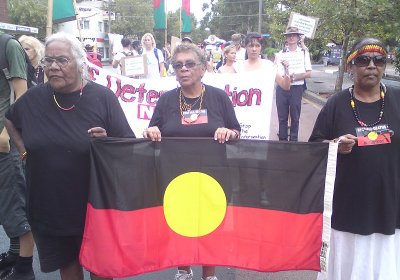On June 30, 31 mainly young activists set off from around NSW in an old converted school bus, for the “Indigenous Solidarity Rides” heading to an Aboriginal rights convergence in Alice Springs over July 6-11. At the same time, 25 activists from Brisbane headed to the convergence, also in a bus, as part of the “Justice Ride”.
Northern Territory Intervention (NTER)
More than 200 people gathered at the Yirara College in Alice Springs over July 6-9 for a conference entitled Defending Indigenous Rights: Land, Law, Culture Convergence.
The convergence brought together Aboriginal communities affected by the Northern Territory intervention to speak and coordinate with anti-intervention and Aboriginal rights groups from around the country.
About 800 people joined the NAIDOC week march on July 9.
Young Kooris mostly led the chants, as a show of Aboriginal pride. The most popular chant was “Always was, Always will be, Aboriginal land”.
Alf Bamblett, executive officer of the Victorian Aboriginal Community Services Association, told the crowd the federal government was extending income management beyond the Northern Territory and there was every chance it could come into Victoria unless it was resisted.
The Northern Territory intervention has reached its third year and, despite several government commissioned reports and outside expert analysis claiming that it has failed to achieve its aims, aspects of it look likely to be extended to other parts of the country.
On June 21, the Senate voted to extend one of the aspects of the intervention, welfare quarantining, to more people in the NT and allow the government the option to extend it to other parts of Australia after a year.
June 21 marked the third anniversary of the Howard government’s “national emergency” intervention in 73 prescribed Aboriginal communities in the Northern Territory, the so-called Northern Territory Emergency Response (NTER).
The federal Labor government passed the Social Security and Other Legislation Amendment (Welfare Reform and Reinstatement of the Racial Discrimination Act) bill on June 21 — exactly three years after the Northern Territory intervention was launched by the Howard-Coalition government.
Welfare quarantining:
• Will be extended to include about 20,000 people in the NT, starting from July 1;
• Can be applied to young people on Centrelink payments, people who have been on unemployment or parenting benefits for more than a year, or people referred by family services;
On June 20, a 100-strong rally against the Northern Territory Emergency Response (the “NT intervention”) was held, protesting its third anniversary. On June 21 the Senate passed legislation allowing one of the most oppressive aspects of the intervention — welfare quarantining — to be extended to all welfare recipients (Indigenous and non-Indigenous) in the NT, and then to targeted communities throughout Australia.
In July, Socialist Alliance election candidates will be taking a trip to the Northern Territory to personally witness conditions under the federal government's intervention into Aboriginal communities.
SA youth candidates — and Resistance members — Jess Moore, Zane Alcorn and Ewan Saunders will join Indigenous activists, students, community groups and campaigners from across the country in Alice Springs for an important gathering of intervention-affected Aboriginal communities.
55 people attended a June 11 forum with Peter Inverway, a Gurindji worker from Kalkaringi, who said Gurindji people are being forced to work up to 30 hours a week for Centrelink entitlements.
Hundreds of Aboriginal workers in the Northern Territory are demanding real wages for construction work that they are compelled to do under “Work for the dole” schemes.
Eighty rallied on June 2 outside state parliament house in Darwin to demand jobs with justice.
Elders from Kalkaringi community say people in their community are being forced to work for up to 30 hours a week on construction sites or they will have their Centrelink payments cut.
Plans are well underway in some states for the “Justice Bus Trips” in July to Alice Springs, where a gathering in defence of Aboriginal justice and human rights activities is being organised. Support for the Aboriginal rights movement has increased steadily over the past year, spurred in no small part by the historic Alyawarr people’s walk-off.
In July 2009, the Alyawarr people walked off their community of Ampilatwatja, which was prescribed as part of the Northern Territory Emergency Response — better known as the NT intervention.
Indigenous affairs minister Jenny Macklin has dismissed the findings of a Menzies School of Health Research report that found “income management” has failed to improve the health and wellbeing of the people it targets.
Income management was implemented by the then Coalition government in August 2007 on 73 targeted remote Aboriginal communities as part of the Northern Territory intervention.
Under the scheme, 50% of welfare recipients’ income is replaced with a Basics Card, which can be used to only buy food, clothing and medical supplies, and only in certain stores.
- Previous page
- Page 6
- Next page

